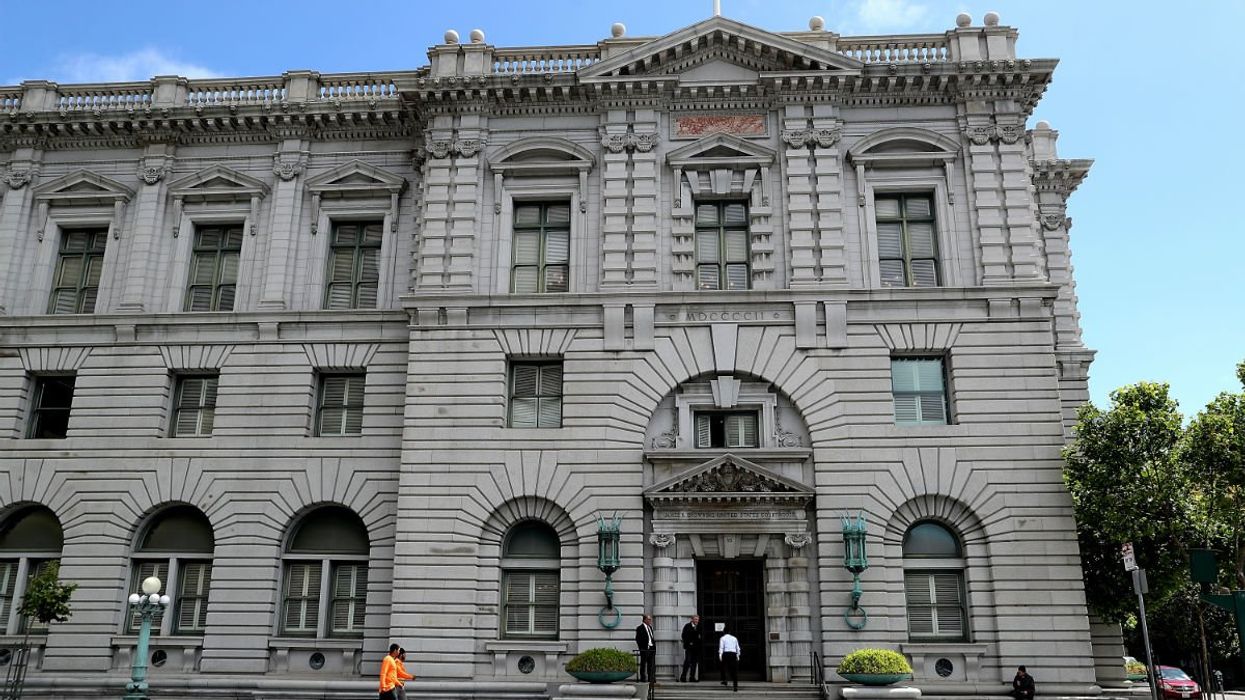
Justin Sullivan/Getty Images

We were told that local governments have the power to shut down your life, liberty, property, and even human breathing mask-free in the interest of public health. But somehow, according to the Ninth Circuit, these same city governments are powerless to clear out public encampments saturated with crime, filth, drugs, and health risks. Put another way, under left-wing jurisprudence, you have a right to camp out anywhere on city streets but no right to walk freely without a mask. Welcome to the woke constitution.
As the ubiquitous problem of public encampments consumes nearly every city in the West, Grants Pass, Oregon, sought to enforce an ordinance against public camping in parks and public streets. Last year, a three-judge panel for the Ninth Circuit, in Johnson v. City of Grants Pass, expanded an absurd 2018 opinion (Martin v. City of Boise) in the same jurisdiction creating an Eighth Amendment right to publicly camp out. You know, because somehow enforcing commonsense public order laws since the dawn of our founding is tantamount to physically cruel punishment targeting an individual!
The city of Grants Pass appealed to have the case heard en banc by the full Ninth Circuit. On July 5, a majority of the 28 current active judges denied the request to hear the case en banc. It appears that the vote was 17-11, although some of the senior judges (partially retired who can’t vote) joined the dissent by senior Judge Diarmuid O’ Scannlain.
“With this decision, our Circuit’s jurisprudence now effectively guarantees a personal federal constitutional ‘right’ for individuals to camp or to sleep on sidewalks and in parks, playgrounds, and other public places in defiance of traditional health, safety, and welfare laws — a dubious holding premised on a fanciful interpretation of the Eighth Amendment,” laments O’Scannlain in a scathing dissent, technically called a “statement” due to his senior status. “We are the first and only federal circuit to have divined such a strange and sweeping mandate from the Cruel and Unusual Punishments Clause. Our jurisprudence in this case is egregiously flawed and deeply damaging — at war with constitutional text, history, and tradition, and Supreme Court precedent.”
Indeed, the city of Grants Pass will appeal the decision to the Supreme Court. However, it is shocking that the Supreme Court has thus far failed to take up the appeal from the original egregious Ninth Circuit ruling in the Boise case. In 2019, the high court denied certiorari rather than expeditiously take up a reversal of such a novel and destructive constitutional ruling. It takes four justices to hear a case, and at the time, there were five GOP appointees on the court – Thomas, Alito, Gorsuch, Kavanaugh, and Roberts. It is possible that there were four votes to hear the case, but they were concerned that Roberts would not rule the right way. With Barrett on the court today, there should be five votes without the chief justice.
The notion that someone has the right to camp out and defile public streets as if it’s an immutable characteristic of the person is insane. In 2000, the Eleventh Circuit (Joel v. City of Orlando) ruled in a similar lawsuit against an Orlando anti-encampment ordinance that cities can always ban a behavior that negatively affects the jurisdiction so long as they are not banning a state of being. “A distinction exists between applying criminal laws to punish conduct, which is constitutionally permissible, and applying them to punish status, which is not,” concluded a unanimous appeals court in favor of a Florida district judge’s ruling. Boise’s law is the same as the one in the Eleventh Circuit in the sense that it prohibits behavior broadly applicable to anyone without targeting an identity.
Of course, to begin with, the entire scope of the constitutional concept of “cruel and unusual punishment” was a degree of severity of criminal punishment, such as torture, not the scope of criminalization of a behavior through police issuing a citation. A citation, by definition, cannot be cruel and unusual, even if there were other legal problems with it. As Justice Thomas wrote in Graham v. Florida, “The Cruel and Unusual Punishments Clause was originally understood as prohibiting torturous methods of punishment—specifically methods akin to those that had been considered cruel and unusual at the time the Bill of Rights” (emphasis added).
Daniel Horowitz
Blaze Podcast Host